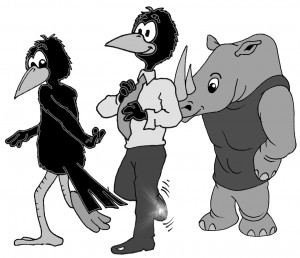Have you ever wondered if you might be the type of person who could be financially successful at owning your own business? Most people have at one time or another. In fact, I hear people nearly every single day of my working life tell me how much they dream of owning their own business.
The problem is, however, that when allowed to elaborate on their dreams, these same people usually end up sharing their feelings about their current lot in life, their boss, their place of employment, and their other team members; and, it is through these ramblings that I am able to learn the true inner workings of their minds. I can get a pretty solid feel for whether these people are cut from the entrepreneurial cloth, or not.
Many carry on aimlessly about how their boss “doesn’t have a clue how to run the business,” or that their “workplace is an absolute train wreck.” Their verbal sewage overflows of talk about the “dirty bathrooms, high food cost, stealing crew members, and low employee morale” – all of which, they deny having any responsibility for, of course; but, if they owned the place, “things would certainly be different”, or so they say.
Let me just state that I do not believe you can become a successful owner of any kind of business without first having a long and successful track record of taking an ownership mentality pertaining to the activities that happen around you in your current or previous places of employment. In reality, formulating and cultivating an ownership mentality over many, many years is one of the key ingredients to becoming successful as an actual business owner down the road. Part of this mindset is the integration of passion and intensity with the prerequisite understanding of the value of a dollar – even when that dollar is not actually yours. This allows one to grow into the giant shoes of having one’s own business.
For me, I started my company, Restaurant Operations Institute, Inc. (ROI, Inc.), back in July 1987. At the time, I was working for a restaurant chain as a W-2 employee. I worked 50–60 hours a week for them; meanwhile, working every chance I could on my new start-up business. As I got better at doing my “day job”, needless to say, I invested more time, money, and effort at growing what I hoped would become my full-time gig – my own company.
Many years passed and I continued to take whatever decent W-2 positions that came my way – the entire time learning and growing and saving my cash. This allowed me to put food on the table for my young family while I seized every opportunity to create the bigger and better future that I longed for. Make no mistake about it, I worked long and hard at creating my very own “American dream”, and I did everything in my power to obtain it.
But, let’s be crystal clear . . . even though I owned the equity of ROI (which was worth absolutely nothing at the time), in my mind, I also “owned” the restaurants that I operated for both my employer and my clients. I “owned” the decisions. I “owned” the way I conducted the business. I “owned” the results – just like I owned ROI. What I realized during these early stages of my development and the development of my company is that, in many instances, the employees, the managers, and the district managers working for these companies actually received more of the bottom-line profits than the equity owners did, themselves.
Equity ownership is nothing other than a legal distinction and, as great and wonderful as that may sound, an ownership mentality regarding one’s career in the industry of his choice – including those with whom he chooses to impart his blood, sweat, and tears – is, many times, worth significantly more.
Without a doubt, I made a pile of mistakes along the way; but, as time passed, I became significantly better at developing this ownership mentality in any and every restaurant and bar I came in contact with. Even though the equity was owned by others, the ownership mindset was owned by me. I drove myself to strive to become the best operator of restaurants in the world. I saw the corporation or the client as nothing other than an investor; anything performance-wise was up to me.
I operated as though the company borrowed money from the bank on my behalf so that I could make the business flow with customers and cash. And, come heck or high water, I was going to drive results and performance to record highs; thereby, winning my paycheck, my bonus, my benefits, and, best of all, my education along with the funding to allow me to grow ROI. It was clearly a “win-win” for all parties involved; but, in my mind, it was I who had the absolute most to gain or lose, and I was not about to let those golden opportunities pass me by.
I learned that a key component to maintaining and growing real-life equity ownership in any business endeavor is that one must start with a hands-on, day-to-day ownership mentality – willing and able to engage in everyday operations. I learned and believe to this day that great owners do not let go of the driver’s seat or take their foot off the gas pedal of their own business; and he or she who operates the best business while maintaining this hands-on approach – no matter how big or successful he or she becomes, wins! Sure, there are exceptions, but very darn few – not enough to risk rolling the dice.
Of course, I spent my entire career within the confines of the restaurant and bar industry, so I decided to create an easy-to-understand formula for those running a restaurant, or multiple restaurants, to learn how best to create an infrastructure that would stand the test of time. I call it the “Rule of 56: for one to maintain a strong ownership mentality, one must break single-unit restaurants, or huge restaurant companies, into parts of 56” – my version of micromanagement.
I surmised that a restaurant has roughly 56 different management functions, i.e.: purchasing, operations, human resources, marketing, etc. (the exact list varies depending on who you ask). If you desire to own the situation, the decisions, and the results, then you’re best off deciding which of those functions are the most impactful to the overall success of the business; then, in essence, cherry-pick those that you want to handle and delegate the others. By taking on this ownership mindset, you can achieve the best possible results that others can only wish for.
Why is the number 56 so significant? Because, in addition to breaking each restaurant down into 56 parts, I also believe that one cannot effectively manage any large restaurant company for any length of time and with any sort of consistency by having the responsibility of more than 56 different restaurant locations; and, those 56 locations are best managed when distributed among eight direct reports with oversight of seven locations each. I have seen rare instances when doing otherwise was successful but, even then, the performance had been stunted dramatically.
I created and used these rules of the road throughout the 1990s. While everyone else seemed to be preaching personal empowerment, I was teaching, training, and inspiring micromanagement. I discovered with micromanagement I could control performance which proved to be a critical key component to the success of any entrepreneurial endeavor. In fact, it has been this “secret formula”, if you will, that has driven my entire career, along with countless others with whom I have gladly shared it for more than 25 years now.
Usually, when I see failing ownerships – either in equity or in mindset, I can point to the lacking of one or more elements to this formula as the contributing factor to their failure – even in their simplest form.
Once you become great at managing a few elements, you are then able to take on a few more, and so on. As a result, while you master the management of each of the 56 elements of the restaurant, your ownership mentality and control expands; and, with it, you are certainly most likely to increase your income, as well.
So the key is knowing yourself and what you are personally great at, then meshing it with what is critically important for the success of the business in the industry which you are in – whether your name is on the entity paperwork, the bank loan, or the insurance policies or not.
Without question, for many years now I have had a much higher level of ownership mentality for their restaurants and bars than do my clients – the owners and managers, themselves. Of course, this approach requires that I get in the muck of the day-to-day operations, marketing, human resources, and financial performance associated with each business – which many are not willing to do, but, quite frankly, these are the parts of the business that I love the most anyway, so it is a “win-win” for me.
Over the more than 25 years that I have been doing this, I have entered into numerous handshake deals (at least 56, I’m sure) where I have provided countless hours of my work and expertise, and, for that matter, my hard-earned money, to those who needed it to get their restaurant start-up off the ground or their restaurant back on track. Each time I’d say the same thing, “after I am long gone and after all is said and done, and after you make this restaurant into a glowing financial success, I expect you to stroke me a check for my part of ownership.” Sadly, to date, I have not received a single check in the mail; but, that does not detour me, because I “own” those restaurants – all 56 parts of them.
It’s with this ownership mentality that I begin each and every day as I focus on my restaurants, my customers, my people, and my financial performance. For me, there’s no other way to do business: I may as well own it, or forget it . . . and I won’t be forgettin’ it any time soon.

